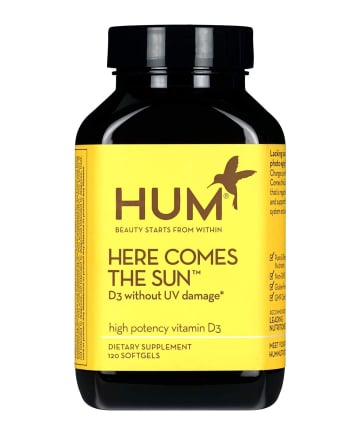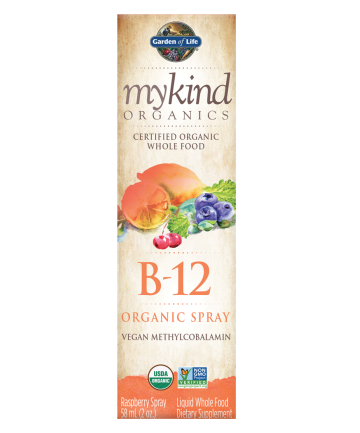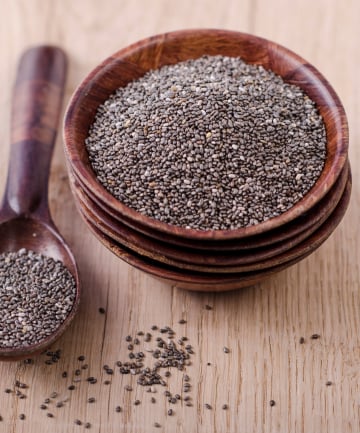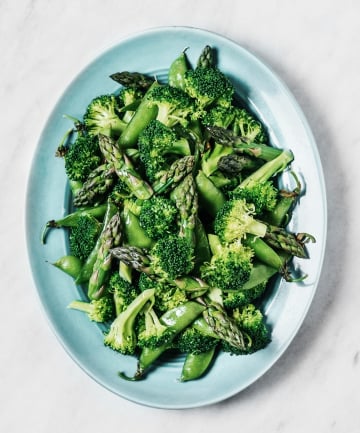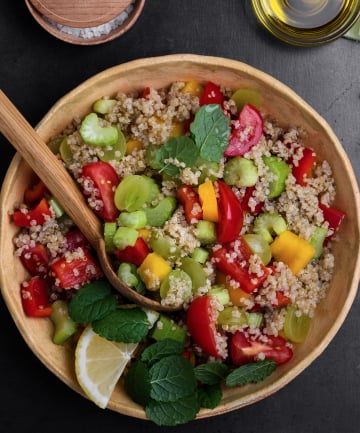Vitamin D is a nutrient that plays a vital role in bone health, as it helps the body absorb the calcium that's coming in. However, this vitamin is more than just calcium's assistant; it's also important on its own for proper muscle and nerve function. According to the National Institutes of Health, "vitamin D deficiency leads to osteomalacia, causing bone pain and muscle weakness."
Luckily, it's not hard to boost your intake: Considine says that the vitamin "can be found in mushrooms or even just thirty minutes of daily sun exposure." And if lots of sun (or mushrooms) aren't for you, you can always go the supplement route. "I often recommend a vitamin D3 supplement," says Cassetty, explaining that it can be difficult to find naturally in many foods. Hum Nutrition has the Here Comes the Sun Vitamin D Supplement, $20, if you're looking for a popular option.
Buy now
Luckily, it's not hard to boost your intake: Considine says that the vitamin "can be found in mushrooms or even just thirty minutes of daily sun exposure." And if lots of sun (or mushrooms) aren't for you, you can always go the supplement route. "I often recommend a vitamin D3 supplement," says Cassetty, explaining that it can be difficult to find naturally in many foods. Hum Nutrition has the Here Comes the Sun Vitamin D Supplement, $20, if you're looking for a popular option.
Buy now
Vitamin B12 is incredibly important for maintaining healthy neurological functions, yet this particular nutrient is typically only found in animal-based food products. In order to get your daily fill of Vitamin B12 — which, according to the National Institutes of Health is also required for "proper red blood cell formation" as well as DNA synthesis — your best bet is to take a supplement. Considine names Garden of Life Organic Vitamin B-12 Spray, $12.94, as one to try.
Buy now
Buy now
There are three different types of omega-3 fatty acids: alpha-linolenic acid (ALA), eicosapentaenoic acid (EPA), and docosahexaenoic acid (DHA). The vitamin company, Ritual, which considers omega-3 fatty acids to be one of its essential ingredients, states that the nutrient is an important part of the cell membrane, and is "also involved in supporting favorable lipid metabolism, immune function and skin health." However, it is mostly EPA and DHA (which are primarily found in fish-based products and oils) that provide these benefits.
ALA is the only one out of the three types that is derived from plants, and Considine says that it "can be found in walnuts, chia seeds and flax seeds." ALA can be converted into EPA and DHA, but only in a limited amount, so it is essential to take vegetarian-friendly supplements to ensure you are getting enough omega-3 fatty acids in your diet.
Image via Westend61/Getty
ALA is the only one out of the three types that is derived from plants, and Considine says that it "can be found in walnuts, chia seeds and flax seeds." ALA can be converted into EPA and DHA, but only in a limited amount, so it is essential to take vegetarian-friendly supplements to ensure you are getting enough omega-3 fatty acids in your diet.
Image via Westend61/Getty
For those living off of a truly plant-based diet (I'm talking to you, vegans), chances are, you're not getting enough calcium. Typically found in dairy products, this nutrient is essential for bone health. A calcium deficiency can lead to osteopenia, which can turn into osteoporosis, making your bones more susceptible to fractures and breaks.
While certain vegetables do serve as a source of calcium — for example, Chinese cabbage, kale, and broccoli — you're probably not eating enough of those to meet you suggested daily intake. There are plenty of supplements out there that can assist you on getting your daily dose.
Image via Claudia Totir/Getty
Image via Claudia Totir/Getty
And finally, since every cell in the human body contains protein, it is absolutely vital that you ingest enough of this nutrient daily. The U.S. National Library of Medicine states that protein gives your body the fuel it needs to repair cells and to make new ones. While meat is an obvious go-to source for protein, there are plenty of plant-based alternatives. Popular choices include soy, legumes, beans, and grains such as quinoa. You can also always go the supplement route (there are tons of options suitable for vegetarians and vegans).
Image via istetiana/Getty
Image via istetiana/Getty


